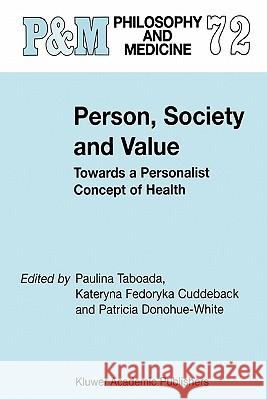Person, Society and Value: Towards a Personalist Concept of Health » książka
Person, Society and Value: Towards a Personalist Concept of Health
ISBN-13: 9789048159710 / Angielski / Miękka / 2010 / 262 str.
A clear understanding of the concept of health plays a key role in defining what health care should comprise and in developing adequate strategies for overcoming the current "health care crisis." This volume is the result of an international and interdisciplinary cooperation between medicine and philosophy on the current debate on the concept of health.
Besides offering a critical analysis of the WHO definition and a review of both ancient and contemporary conceptions of health, the cooperative effort of physicians and philosophers presented in this book works through the challenges which any definition of health faces, if it is to be both truly personalist, and at the same time operational.
The overall purpose of this book is to capture the essentials of human health and to propose the outlines for a personalist understanding of this concept, i.e., a conception that does justice to the personal nature of human beings by introducing dimensions that are essential to personal life and well-being, such as the realms of rationality, affectivity and freedom, the realms of meaning, values, morality, and spirituality, the realms of social and interpersonal relations.
To grasp the uniqueness of the human person is not yet to grasp the specific nature of personal health. But it is certainly a first step, and it becomes evident that every theory of human health presupposes a theory of the person. Accordingly, the debate presented in this book is no less a debate about the nature of the human person than it is a debate about the nature of health.
The investigations offered in this volume intend to provide an impetus for new conceptions of personhood and human health. The phenomenological approach has the advantage of advocating a systematic conception of the total person which combines surface experiences (subjective experiences of well-being) with deeper dimensions of the person (value and being).
An adequate conception of the human person has enormous implications not only for our understanding of what constitutes the health and well-being of the person, but also for our conception of what health care should comprise. Hence, answering the philosophical questions, such as those raised in this volume about health, is crucial for the solution of political problems such as how to legislate health care policy.











